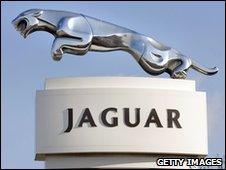Jaguar Land Rover to assemble cars in China
- Published

The firm said it remained committed to the UK
Carmaker Jaguar Land Rover is going to start assembling vehicles in China, the BBC can confirm.
"We will need to manufacture at least two models in China," said chief executive Carl-Peter Forster in an interview.
"We'll take one to two years to set it up, but first we will need a partner."
The company said the move into China is not a shift out of the UK, where it is planning to hire an extra 1,000 workers this year.
The new jobs that are being created will be temporary and are linked to the production of new compact Range Rover model due next year - the production version of the Land Rover LRX that was revealed earlier.
"It takes a year or two before the jobs become permanent," said Mr Forster, who is also chief executive of Tata Motors, Jaguar Land Rover's parent company.
Last year, Jaguar Land Rover's workforce in the UK was reduced by about 2,500 people to 16,000.
Profits return
Jaguar Land Rover has recently seen a big increase in global sales of both its Jaguar models and its Land Rover 4x4 vehicle marque - which includes the Range Rover models.
During the year to March, 193,982 vehicles were sold and this year the company expects to sell more than 200,000.
Pre-tax profits came in at £32m for the year, after two years of losses during the downturn.
"It's been a very good year for us," said Mr Forster.
Much of the growth came from China, where Jaguar sales rose 38% and Land Rover sales rose 55% during the year. The market is also strong in India, where the company will start producing Land Rover models next year.
But Mr Forster was eager to stress that China, or indeed India, would "never be the centre for Jaguar Land Rover, it will remain in the UK", he said.
"Most of the volume growth [in these markets] will benefit the UK operations," he said.
Rapid growth
In future, Jaguar Land Rover is aiming to grow sales in new markets on the back of a much broader model line-up.
"The brands are strong and attractive and we don't cover all the segments yet," said Mr Forster. "We don't even have a full engine line-up. There's so much growth potential."
But although the company is hoping to grow, it is still planning to go ahead with its plan to close either its factory at Castle Bromwich or its Solihull factory within 10 years.
"We are talking about having one efficient operation rather than two inefficient operations," Mr Forster said. "We are not necessarily talking about getting rid of people.
"We want to grow the business and we want to make sure we can provide jobs for the people."
Government support
Jaguar Land Rover's plans to retain and grow its operations in the UK are beneficial as the company also supports many suppliers, Mr Forster insisted, urging the government to keep up support for research and development to ensure the industry's strength in the future.
"The question is, will there be a technology base in the UK or not," he said.
"The centre of gravity for the [European] auto industry is on the Continent and we have to pull the centre of gravity towards the UK."
Tata Motors bought Jaguar and Land Rover from US group Ford for £1.15bn in 2008.